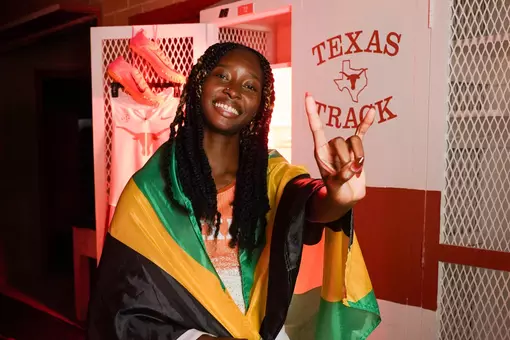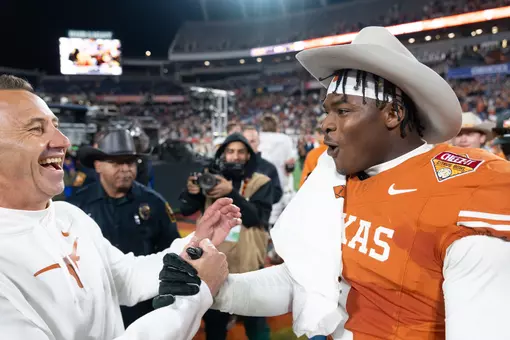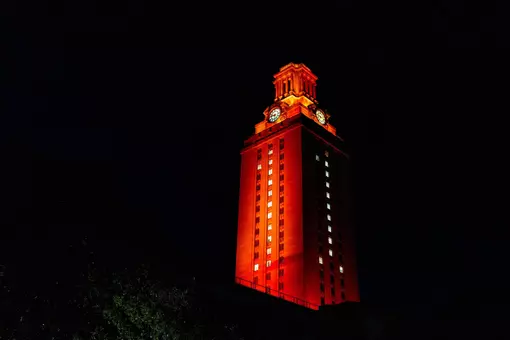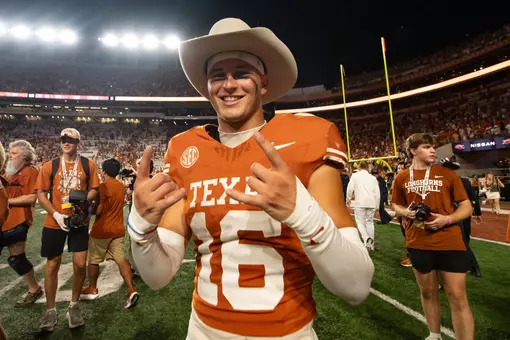The University of Texas at Austin Athletics
Bill Little commentary: The orange in Marian Dozier
08.20.2014 | Longhorn Foundation, Bill Little Commentary
Bill Little comments on longtime friend and Texas Athletics supporter Marian Dozier, who recently donated a significant gift to name the football and baseball press boxes the Bill Little Media Center.
Bill Little comments on longtime friend and Texas Athletics supporter Marian Dozier, who recently donated a significant gift to name the football and baseball press boxes the Bill Little Media Center. Read more here.
Bill Little, Texas Media Relations
In the late 1990s, there was a popular personality test called "True Colors."
A simple test would show if you were aligned with the characteristics of four colors. You could be blue, green, gold, or orange.
Marian Dozier was "orange."
There is irony in that, since coming to Austin in 1968 Marian and her family have been loyally linked to the color orange. Because the personality test defines her perfectly.

Orange, you see, is the true color of a person who is "action-oriented, quick-witted, charming, spontaneous, playful, a risk-taker, creative, a multi-tasker, cheerful, energetic, bold, quick acting, a performer, a problem-solver, a negotiator, and a person who is resilient."
And that, my friends, is the quintessential Marian Dozier.
If you want to take the test, you will find Marian has characteristics of the other three colors as well. The odyssey of Marian and Dick Dozier from two college kids at Oklahoma City University in the early 1950s to a role among the corporate giants of America's fast food industry is story linked together with ingenuity, and the core values once set forth by Marian's good friend, Mack Brown—faith, family, friends and a common purpose.
It includes four sons and their families, a legion of faithful employees and friends, and a faith that found the owners of a fledgling company called Austaco kneeling by the bed at night, praying that just enough people would buy their nineteen cent tacos to keep their single store on Burnet Road in business.
The fate that had brought them to Austin was a journey in itself. Marian married Dick after he graduated from Air Force Officers Training, following his time playing basketball at OCU where Marian, a former high school cheerleader, was a student. They then followed Dick's career as a highly successful high school coach to city after city, and success after success. Finally, in the mid-1960s, when it appeared that a career change would be appropriate, Dick ran into a former player who invited him to come to Houston and join him a fast food business which had started only six years before and had only a few stores outside of California.
"It's called 'Taco Bell,'" the young man had said.
"What's a taco?" Dick replied.
When Dick Dozier died of a rare form of leukemia in 1996, Marian moved from her role as the company's head cheerleader and the employee's best friend to head of the company. By the time Marian sold her controlling interest in Austaco several years ago to their son, Dirk, the company had become the largest fast food franchisee in the state, at one point owning more than 79 Taco Bell and 45 Pizza Hut stores throughout all of Central Texas.
Austaco's growth made it part of the "Big 12," which is comprised of the 12 largest Taco Bell franchises in the United States. In the early 2000s, Marian became the first woman to be honored with the Glen Bell Award (founder of Taco Bell) as the nation's outstanding franchisee, an award she accepted with Dirk. In 2003 Marian received a "Cheese Head Award" epitomizing all that Yum Brands and Pizza Hut stand for when it comes to family business.
The Dozier connection with Austin and The University of Texas came when they had been a part of the opening of the single store on Burnet Road in 1968, and it coincided with one of the greatest eras of Texas football. And it didn't take long for Dick and Marian to connect with fellow Oklahomans Darrell and Edith Royal.
In the 1970s, long before today's current concepts of marketing were in vogue, the Doziers realized that a potential way to reach new customers was a blank piece of cardboard—that just happened to be the back of tickets to Longhorn games. So with that, they became the Athletics Department's first "corporate sponsor," placing an ad on the back of the tickets that offered free tacos to the holder of the used ticket stub.
The Dozier family, with sons Doug, Dirk, Jay and Rich, settled in a home in North Austin before eventually moving to Westlake, and Marian was "mom" to just about every kid in the neighborhood. Soon, a cove on Lake Travis became a family retreat just a few miles from Austin. Before Dick died, Marian and Dick built a lighthouse in the cove, which became a beacon. Sitting high above the water with a great view of the famous Texas sunsets, the lake place became the site of many Fourth of July parades, reflecting Marian's patriotism as well as her pride in the Doziers' family values.
Coinciding with all of the changes during the mid-'70s, Dick's former OCU teammate and coach Abe Lemons had moved from Oklahoma and had become highly successful as the head coach at Pan American University. The Doziers often traveled to the Rio Grande Valley to see Abe and his wife Betty Jo. As it turned out, it wasn't long until an even stronger alliance occurred. In 1976, Royal (as athletics director) hired Lemons as the head basketball coach of the Longhorns.
The move reunited the player and the coach. With the coming of a new basketball facility which was then called "The Special Events Center," Lemons' basketball program took off. In 1978, his Longhorns went to New York and won the then prestigious National Invitation Tournament (at the time only 32 teams were invited to the NCAA playoffs).
The Dozier family secured ticket options on most of an entire section behind the scorer's table for the men's games when the building opened, and when the renamed Frank Erwin Center was remodeled, Marian purchased courtside seats for Longhorn women's games.
It was during Lemons' era that the Dozier link to Texas solidified. Sons Jay and Rich (known as Richie at the time) became ball boys at Longhorn games, where Rich once got to participate in a shooting contest at halftime at a Texas game. After Lemons left Texas in the mid-1980s, Rich would follow him to Oklahoma City, where he became a starter at the same school where his dad had played.
Even though the tough times of Lemons departure were hard, the Doziers never wavered in their support of Texas basketball. When the Cooley Pavilion was built during the remodeling of the basketball facilities, Marian, on behalf of her sons and in memory of Dick, gifted the Dozier Court—the practice facility for men's basketball, as well as the Marian Dozier Instructional Video Lab, where men's and women's teams could study game tapes. She agreed that her name could be attached so that young people could see the positive possibilities of women succeeding in the work place beyond college.
Doug, the oldest son (who died in 2012), eventually became a basketball official. Dirk, who became president of Austaco when Marian sold him her interest, has continued philanthropic interests after a second sale of the company last year. Rich was head of the Pizza Hut division of Austaco until he left to become a high school basketball coach, following in his dad's footsteps in leading teams into the state UIL playoffs. Jay, who became one of the Longhorns' biggest fans during his student days, studied for the ministry and was pastor of a church in Kerrville until recently resigning to pursue other endeavors.
Marian's stunning list of activities includes causes and board memberships such as the Longhorn Foundation Advisory Council, the Neighborhood Longhorns, Any Baby Can, the Dell Children's Hospital Specially for Children Infusion Center, the Miracle Foundation, the President's Council of Austin Lyric Opera and her church Shepherd of the Hills Christian (Disciples of Christ), of which she and the family were founding members in the early 1970s.
She has been honored by the First Tee of Austin and recognized as one of Austin's most influential women by the Austin Business Journal, has served on the board of Brite Divinity School at TCU, and has worked with the Leukemia and Lymphoma Society and the Greater Austin Chapter of the National Football Foundation. She has been recognized and honored by Taco Bell nationally.
Most of all, her gifts have come from the people. Each year at Christmas, Marian used to visit every store in the company, taking Christmas gifts. Employees felt her love and support, and learned the true meaning of a hug, and a smile.
People love Marian, because she loves them. Packed inside a spunky cheerleader's body is a dynamo who most of her recent years could be found on the golf course or the tennis court.
It is not by accident that the motto the Doziers chose for their company motto is "Here to serve." It is in that space that Marian leads the family. Recently, when someone asked her about the rising price of tickets to Longhorn games, Marian thought for a minute.
"This ticket," she said, "isn't about the price of admission to a game or an event. It is a commitment to young people. It is the reason that a young woman can have the same opportunities for an education as a star quarterback. And in that sense, it is worth every penny of it.
In the personality test, blue represents loyalty. Green means you are assertive. Gold reflects a need to belong through carrying a load. But listen again to the definition of "orange":
"Orange represents energy, it generates an impulse toward active doing: sport, struggle, competition and enterprising productivity. In temporal terms, Orange is the present."
And that, better than anything, defines Marian Dozier.





